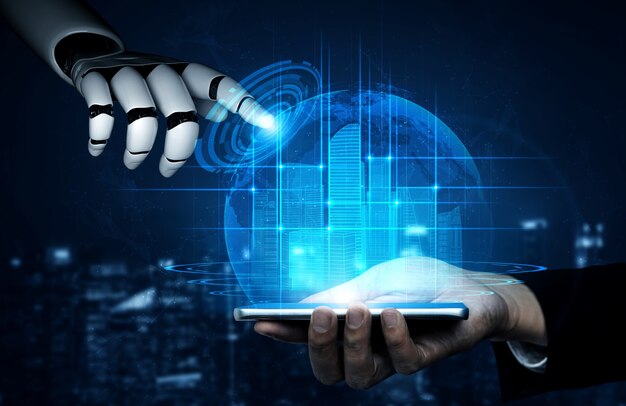Living with AI: How Artificial Intelligence Is Shaping Our World

Here are some key areas where AI is transforming our experiences, making life easier, and occasionally raising questions about what it means for our future.
AI at Home: Convenience at Your Fingertips
Many of us experience AI first thing in the morning when our smartphone assistants remind us of meetings, weather updates, and news headlines. Smart speakers, like Amazon’s Alexa or Google Home, allow us to control nearly every part of our household with voice commands. From adjusting the lighting and temperature to managing appliances, these devices make life at home more comfortable and convenient.
AI-powered security systems offer another layer of safety, giving real-time notifications and remote monitoring for our homes. With advancements in voice and facial recognition, AI is making our homes smarter and more secure than ever before, and it’s likely that future innovations will bring even more personalized experiences.
— Transforming Transportation: Smarter Travel Options —
AI’s influence on transportation is another big game-changer, from navigation apps that optimize our routes based on real-time traffic data to self-driving cars that are being tested on public roads. Ridesharing companies like Uber and Lyft rely on AI algorithms to predict demand, set prices, and route drivers, improving the efficiency of urban travel. Meanwhile, AI in aviation and rail networks enhances scheduling and safety, aiming to make public transportation smoother and more efficient.
The continued development of autonomous vehicles promises to reduce accidents and ease traffic congestion, revolutionizing how we move through our cities. Although we’re still a few years from fully self-driving cars on a mass scale, the steps being taken now highlight AI’s potential to make travel safer and more sustainable.
— AI at Work: A New Kind of Coworker —
In the workplace, AI is helping with everything from managing email inboxes to automating customer service and assisting in data analysis. AI-powered programs, such as those in marketing, streamline campaigns and give insights into consumer behavior, while tools like chatbots enhance customer service by offering quick responses and round-the-clock support.
In fields like medicine and finance, AI is significantly enhancing efficiency. Doctors use AI for diagnostic purposes, such as analyzing medical images and predicting patient outcomes. In finance, AI algorithms analyze vast amounts of data to spot trends, manage risk, and even prevent fraud. As AI continues to evolve, it’s likely to take over repetitive tasks, allowing humans to focus on more creative and strategic work.
— Education Enhanced by AI: Personalized Learning for All Ages —
In classrooms, AI is bringing new opportunities for personalized learning. Programs like adaptive learning platforms adjust to each student’s skill level, offering tailored exercises and feedback. This personalized approach helps both students and teachers, making learning more engaging and effective.
Beyond traditional education, AI has become a resource for lifelong learning. Language-learning apps, coding platforms, and professional training courses are utilizing AI to create custom learning plans that evolve with each user’s progress, allowing people of all ages to learn at their own pace.
— Healthcare Innovations: AI as a Life-Saving Partner —
In healthcare, AI is making strides in diagnosing illnesses, predicting patient outcomes, and supporting medical research. Imaging systems powered by AI can analyze X-rays, MRIs, and other scans far more quickly and accurately than ever before, helping to detect conditions like cancer at early stages. AI-driven tools are also invaluable in genomics and drug discovery, accelerating the development of treatments and making personalized medicine a reality.
Wearable health devices like fitness trackers and smartwatches now monitor everything from heart rate to sleep quality, alerting users to potential health concerns and encouraging proactive wellness. As these technologies continue to improve, AI will play an even bigger role in preventive healthcare, helping people live healthier lives.
— Entertainment Tailored Just for You —
The entertainment industry was quick to embrace AI, and today, most of us experience it daily when we stream movies, listen to music, or browse social media. Platforms like Netflix and Spotify use AI algorithms to recommend content based on our preferences, curating personalized lists that keep us engaged.
Social media platforms like Facebook and Instagram also rely heavily on AI to show us relevant content and even moderate what we see. However, this has raised concerns about echo chambers and the impact of AI on mental health. While these tools enhance convenience and entertainment, they also invite questions about privacy and the ethical implications of AI-driven choices.
— The Road Ahead: Ethical Questions and Future Possibilities —
As we embrace AI in our everyday lives, new ethical questions arise. Issues surrounding data privacy, the potential for job displacement, and the risk of over-reliance on AI are topics of ongoing debate. Striking a balance between the benefits of AI and the need for privacy, security, and ethical boundaries will be crucial as technology continues to evolve.

